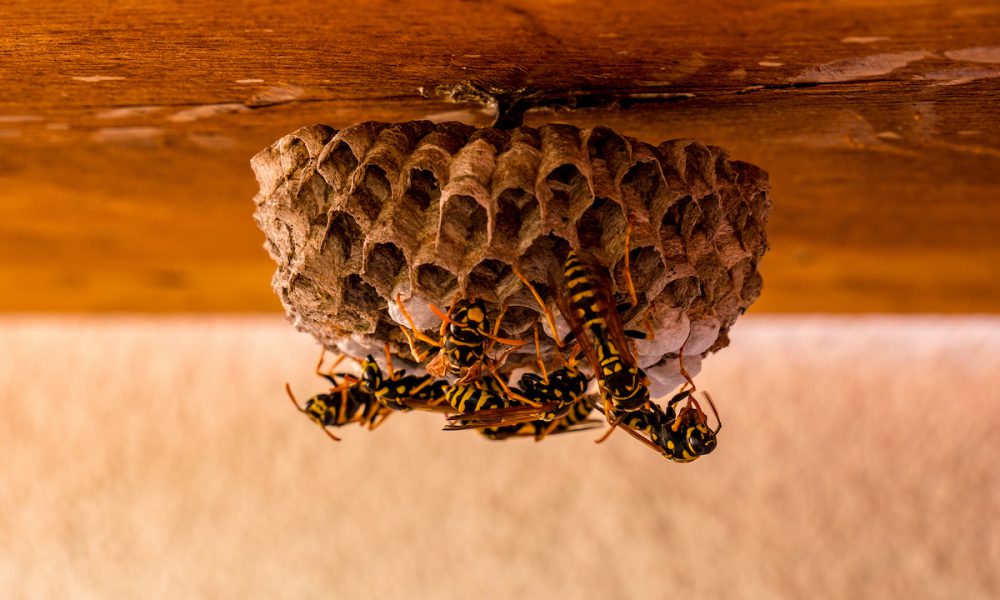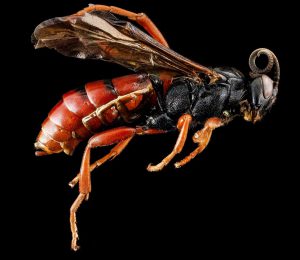
I get a LOT of calls from people in reference to wasps being inside of their house. The calls pretty much come in year round.
One of the most common ways that wasps get into homes is actually through doors and windows. Leaving doors and windows open is nothing short of an invitation for wasps, bees, and any other insects that want to enter your home. If you leave windows open, make sure that they have screens on them. If they do have screens on them, make sure that the screens don’t have any holes in them, and that they fit properly around the edges and corners. During the spring and summer time, when wasps are most active, they will frequently build and inhabit nests around your main entrance doorways, partly because these areas are usually covered in some manner, thus protecting the wasps and their homes from the elements. During these active seasons, even opening the door briefly to enter or exit can allow enough time for swarming wasps to enter.
Another very common place to find wasps nesting is in attic spaces. It is VERY easy for wasps to get into attics, normally due to openings around vents, and / or poor construction practices that leave big gaps between the sections of wood near the areas where the shingles and gutters meet up. If there are any unsealed openings, such as open attic vents, or attic vents that don’t seal properly, it is extremely easy for wasps to enter the main parts of your home.
Have a fireplace? Make sure that your chimney flue is closed. I have opened many flues, only to have a dozen or so wasps fall down onto the floor of the fireplace. Even if the flue is closed, make sure that it closes and seals properly.
Last but not least, another common entry point that I have encountered on many occasions is through the bathroom exhaust vents, which typically exit on the side of your home. Bathroom exhaust fans will have some sort of duct attached to them, and will exit the home through a wall, usually with some sort of spring loaded or gravity operated flap cover on the outside end of it. Often times, these covers will either break off, or won’t close properly, due to debris preventing it from closing.
If you have issues with wasps in your home, addressing the above mentioned areas will surely solve your problem.
Contribution
Wasps, like bees, aren’t inherently bad. They pollinate and contribute to the environment in a positive way. Unfortunately, when people get around them, wasps are known to get aggressive. Many people are allergic to their stings which makes them exponentially dangerous. The key to control is to eliminating wasp nests before they get large. When they get into your house, you will likely want to take natural remedies that are safe for your house and your family to get rid of them.
Nests
Wasps look for eaves, porch ceilings and overhangs as a sturdy, horizontal base to hang from. Ideally, they like a corner spot where the nest will be more protected.
If wasps made a nest somewhere on your property last year it is likely they won’t come back to it. The pattern is that wasps abandon their nests in the fall and leave the weather to take its course to decompose it. The downside is that the queen seeks shelter indoors to survive the winter.
Food Supply
Wasps help to control the insect population by eating other bugs which placing them in the category of beneficial yard pests. The bad news is that if they decide your home is a good nesting location, that probably means there’s an ample food supply nearby.
Contact Us
Choose Proactive Pest Control for professional, comprehensive, guaranteed pest, and lawn management. The pros at Proactive will work diligently to gain your trust, confidence, and your total satisfaction. CALL US TODAY at 770-800-PEST to schedule a free, no-obligation inspection and evaluation for your home or business. Or, contact us for a FREE consultation. Let us show you why Proactive Pest Control is northeast Georgia’s first choice for pest, termite, and lawn services.
